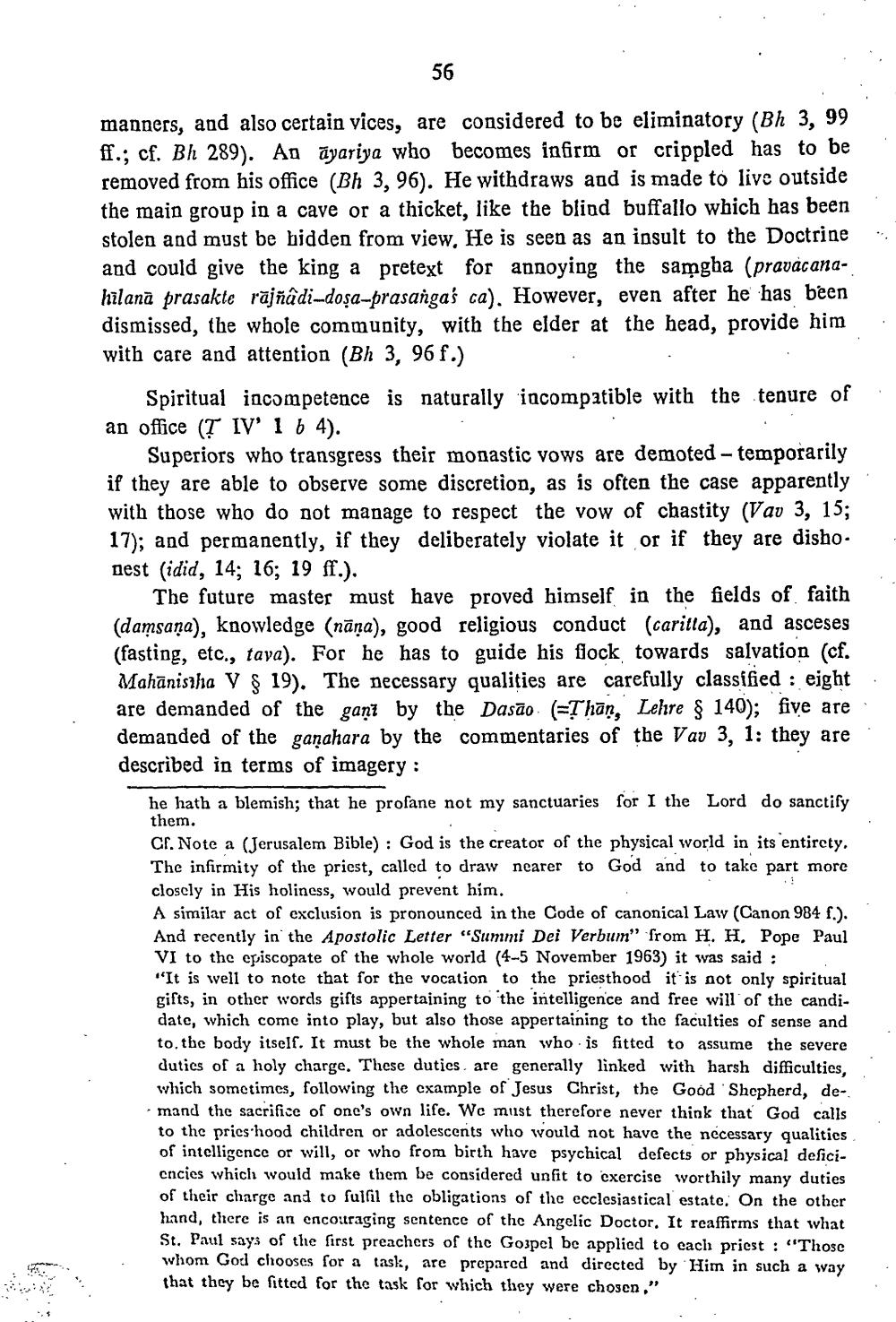________________
56
..
bim
.
manners, and also certain vices, are considered to be eliminatory (Bh 3, 99 ff.; cf. Bh 289). An āyariya who becomes infirm or crippled has to be removed from his office (Bh 3, 96). He withdraws and is made to live outside the main group in a cave or a thicket, like the blind buffallo which has been stolen and must be hidden from view. He is seen as an insult to the Doctrine and could give the king a pretext for annoying the samgha (pravácanahilana prasakte rājñûdi-doșa-prasangaś ca). However, even after he has been dismissed, the whole community, with the elder at the head, provide him with care and attention (Bh 3, 96 f.)
Spiritual incompetence is naturally incompatible with the tenure of an office (T IV' 1 64).
Superiors who transgress their monastic vows are demoted - temporarily if they are able to observe some discretion, as is often the case apparently with those who do not manage to respect the vow of chastity (Vav 3, 15; 17); and permanently, if they deliberately violate it or if they are disho. nest (idid, 14; 16; 19 ff.).
The future master must have proved himself in the fields of faith (damsaņa), knowledge (nāņa), good religious conduct (caritla), and asceses (fasting, etc., taya). For he has to guide his flock towards salvation (cf. Mahānisha y 19). The necessary qualities are carefully class are demanded of the gant by the Dasão EȚhān, Lehre § 140); five are demanded of the ganahara by the commentaries of the Vav 3, 1: they are described in terms of imagery :
he hath a blemish; that he profane not my sanctuaries for I the Lord do sanctify them. Cr. Note a (Jerusalem Bible) : God is the creator of the physical world in its entirety. The infirmity of the priest, called to draw nearer to God and to take part more closely in His holiness, would prevent him. A similar act of exclusion is pronounced in the Code of canonical Law (Canon 984 f.). And recently in the Apostolic Letter "Summi Dei Verbum" from H. H. Pope Paul VI to the episcopate of the whole world (4-5 November 1963) it was said : "It is well to note that for the vocation to the priesthood it is not only spiritual gifts, in other words gifts appertaining to the intelligence and free will of the candidate, which come into play, but also those appertaining to the faculties of sense and to the body itself. It must be the whole man who is fitted to assume the severe dutics of a holy charge. These duties are generally linked with harsh difficulties, which sometimes, following the example of Jesus Christ, the Good Shepherd, demand the sacrifice of one's own life. We must therefore never think that God calls to the prics hood children or adolescents who would not have the necessary qualitics of intelligence or will, or who from birth have psychical defects or physical deficicncies which would make them be considered unfit to exercise worthily many duties of their charge and to fulfil the obligations of the ecclesiastical estate. On the other hand, there is an encouraging sentence of the Angelic Doctor. It reaffirms that what St. Paul says of the first preachers of the Gospel be applied to cach priest : "Those whom God chooses for a task, are prepared and directed by Him in such a way that they be fitted for the task for which they were chosen,"




